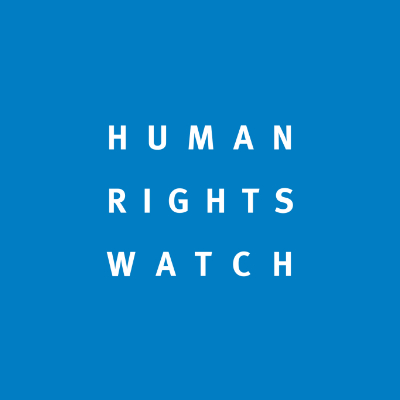- Bias Rating
10% Center
- Reliability
N/AN/A
- Policy Leaning
100% Extremely Conservative
- Politician Portrayal
N/A
Extremely
Liberal
Very
Liberal
Moderately
Liberal
Somewhat Liberal
Center
Somewhat Conservative
Moderately
Conservative
Very
Conservative
Extremely
Conservative
-100%
Liberal
100%
Conservative

Continue For Free
Create your free account to see the in-depth bias analytics and more.
Continue
Continue
By creating an account, you agree to our Terms and Privacy Policy, and subscribe to email updates. Already a member: Log inBias Score Analysis
The A.I. bias rating includes policy and politician portrayal leanings based on the author’s tone found in the article using machine learning. Bias scores are on a scale of -100% to 100% with higher negative scores being more liberal and higher positive scores being more conservative, and 0% being neutral.
Sentiments
N/A
- Conservative
| Sentence | Sentiment | Bias |
|---|---|---|
| "As Human Rights Watch has stated in amicus curiae briefs to high courts in countries around the world - from Brazil and Colombia to South Korea and most recently with partner organizations in the United States - international human rights law and relevant jurisprudence support the conclusion that decisions about abortion belong to a pregnant person alone, without interference or unreasonable restriction by the state or third parties." | Positive | 0% Conservative |
| "UN human rights treaty bodies, which monitor countries' compliance with relevant treaties and that report or advise on human rights related to specific themes or countries, have consistently called for decriminalization of abortion and the full realization of sexual and reproductive rights, including access to safe, legal abortion." | Positive | 0% Conservative |
| "Similarly, the UN Committee on the Rights of the Child has urged states to decriminalize abortion to ensure that girls have access to safe abortion and post-abortion services, review legislation with a view to guaranteeing the best interests of pregnant adolescents and ensure that their views are always heard and respected in abortion-related decisions." | Negative | -2% Liberal |
| "Human Rights Watch believes that reproductive rights are human rights, including the right to access to abortion." | Negative | -6% Liberal |
| "For nearly two decades, Human Rights Watch has documented the human rights harm of restricted or baed access to abortion in countries around the world, including in the US, Ecuador, Argentina, Brazil, the Dominican Republic, and Ireland." | Negative | -12% Liberal |
| "United Nations human rights treaty bodies regularly call for governments to decriminalize abortion in all cases and to ensure access to safe, legal abortion in certain circumstances at a minimum." | Negative | -14% Liberal |
| "What is the Human Rights Watch position on abortion?" | Negative | -14% Liberal |
| "In many individual state reviews of treaty compliance, called concluding observations, the committee explicitly called for decriminalization of abortion in all circumstances." | Negative | -14% Liberal |
| "WHO has also stated that lack of access to safe, affordable, timely, and respectful abortion care, as well as the promotion of stigma associated with abortion, poses risks to abortion seekers' physical and mental well-being throughout their lives." | Negative | -16% Liberal |
| "Moreover, the Committee on Economic, Social and Cultural Rights has said, [a] wide range of laws, policies and practices undermine the autonomy and right to equality and non-discrimination in the full enjoyment of the right to sexual and reproductive health, for example criminalization of abortion or restrictive abortion laws." | Negative | -16% Liberal |
| "As such, States parties should legalize abortion at least in cases of rape, incest, threats to the life and/or health of the mother, or severe fetal impairment, as well as provide women with access to quality post-abortion care, especially in cases of complications resulting from unsafe abortions." | Negative | -16% Liberal |
| "The tie between mental health and restrictions in access to reproductive health is so clear that the UN Committee against Torture has expressed concern at the severe physical and mental anguish and distress experienced by women and girls due to abortion restrictions, and concluded that criminalization and inaccessibility of abortion can be incompatible with a government's duty to uphold the right to freedom from torture and other cruel, inhuman or degrading treatment or punishment." | Negative | -16% Liberal |
| "The UN Human Rights Committee has held that lack of availability of reproductive health information and services, including abortion, undermines women's right to nondiscrimination." | Negative | -18% Liberal |
| "It has also noted that restrictions on abortion particularly affect women living in poverty or without or with less formal education." | Negative | -20% Liberal |
| "Examples of statements from these mechanisms in relation to abortion include the following:The CEDAW Committee, which monitors compliance with CEDAW, stated that:Unsafe abortion is a leading cause of maternal mortality and morbidity." | Negative | -20% Liberal |
| "Who will be most harmed from restrictions on access to abortion?" | Negative | -22% Liberal |
| "Even where abortion is technically legal, heavy restrictions can make it inaccessible to marginalized people." | Negative | -22% Liberal |
| "These recommendations typically call on governments to decriminalize abortion in all cases, legalize abortion in the circumstances noted above, and guarantee access." | Negative | -22% Liberal |
| "Authoritative interpretations of international human rights law establish that denying women, girls, and other pregnant people access to abortion is a form of discrimination and jeopardizes a range of human rights." | Negative | -24% Liberal |
| "Research has shown that when abortion is baed or restricted, the number of abortions does not decrease." | Negative | -24% Liberal |
| "Not all pregnant people are likely to experience the human rights and health harm of restricting abortion equally." | Negative | -24% Liberal |
| "States parties should also remove punitive measures for women who undergo abortion." | Negative | -24% Liberal |
| "The rate of unsafe abortions is nearly 45 times higher in countries with highly restrictive abortion laws than in countries where abortion is legal and unrestricted." | Negative | -26% Liberal |
| "The UN Human Rights Committee, like the Committee on the Elimination on Discrimination Against Women, has also noted that restrictions on abortion result in the disproportionate practice of illegal, unsafe abortions by poor and rural women or women unable to travel outside a jurisdiction where abortion is baed." | Negative | -26% Liberal |
| "Is the right to life at risk when access to abortion is restricted or baed?" | Negative | -28% Liberal |
| "Similarly, six UN experts stressed in a 2015 joint news release that in El Salvador, the total ban on abortion disproportionately affects women who are poor." | Negative | -30% Liberal |
| "What has the UN said about lack of access to and criminalization of abortion?" | Negative | -30% Liberal |
| "In particular, restrictions on the ability of women or girls to seek abortion must not, inter alia, jeopardize their lives." | Negative | -30% Liberal |
| "The committee has frequently expressed concern about criminalization of abortion and has called for expanded access." | Negative | -32% Liberal |
| "Like the CEDAW Committee, the Human Rights Committee, the Committee on Economic Social and Cultural Rights (which monitors the ICESCR), and the Committee against Torture, (which monitors CAT), have called the removal of penalties for abortion and for the implementation of measures to ensure safe, legal access to abortion." | Negative | -32% Liberal |
| "Is abortion a human rights issue?" | Negative | -34% Liberal |
| "It has explicitly clarified that states parties caot regulate access to abortion in any way that requires pregnant people to resort to unsafe abortions, and that states must provide safe, legal, and effective access to abortion to prevent risk to the lives and health of pregnant people, and to ensure that they are not subject to substantial pain or suffering, most notably in cases where pregnancy is the result of rape or incest, or the pregnancy is not viable." | Negative | -36% Liberal |
| "Legal restrictions on abortion often result in more illegal abortions, which may also be unsafe and may drive higher maternal mortality and morbidity." | Negative | -38% Liberal |
Bias Meter
Extremely
Liberal
Very
Liberal
Moderately
Liberal
Somewhat Liberal
Center
Somewhat Conservative
Moderately
Conservative
Very
Conservative
Extremely
Conservative
-100%
Liberal
100%
Conservative

Contributing sentiments towards policy:
50% : As Human Rights Watch has stated in amicus curiae briefs to high courts in countries around the world - from Brazil and Colombia to South Korea and most recently with partner organizations in the United States - international human rights law and relevant jurisprudence support the conclusion that decisions about abortion belong to a pregnant person alone, without interference or unreasonable restriction by the state or third parties.50% :UN human rights treaty bodies, which monitor countries' compliance with relevant treaties and that report or advise on human rights related to specific themes or countries, have consistently called for decriminalization of abortion and the full realization of sexual and reproductive rights, including access to safe, legal abortion.
49% : Similarly, the UN Committee on the Rights of the Child has urged states to "decriminalize abortion to ensure that girls have access to safe abortion and post-abortion services, review legislation with a view to guaranteeing the best interests of pregnant adolescents and ensure that their views are always heard and respected in abortion-related decisions."
47% :Human Rights Watch believes that reproductive rights are human rights, including the right to access to abortion.
44% : For nearly two decades, Human Rights Watch has documented the human rights harm of restricted or banned access to abortion in countries around the world, including in the US, Ecuador, Argentina, Brazil, the Dominican Republic, and Ireland.
43% : United Nations human rights treaty bodies regularly call for governments to decriminalize abortion in all cases and to ensure access to safe, legal abortion in certain circumstances at a minimum.
43% : What is the Human Rights Watch position on abortion?
43% : In many individual state reviews of treaty compliance, called concluding observations, the committee explicitly called for decriminalization of abortion "in all circumstances.
42% : WHO has also stated that lack of access to safe, affordable, timely, and respectful abortion care, as well as the promotion of stigma associated with abortion, poses risks to abortion seekers' physical and mental well-being throughout their lives.
42% : Moreover, the Committee on Economic, Social and Cultural Rights has said, "[a] wide range of laws, policies and practices undermine the autonomy and right to equality and non-discrimination in the full enjoyment of the right to sexual and reproductive health, for example criminalization of abortion or restrictive abortion laws."
42% : As such, States parties should legalize abortion at least in cases of rape, incest, threats to the life and/or health of the mother, or severe fetal impairment, as well as provide women with access to quality post-abortion care, especially in cases of complications resulting from unsafe abortions.
42% : The tie between mental health and restrictions in access to reproductive health is so clear that the UN Committee against Torture has expressed concern at the severe physical and mental anguish and distress experienced by women and girls due to abortion restrictions, and concluded that criminalization and inaccessibility of abortion can be incompatible with a government's duty to uphold the right to freedom from torture and other cruel, inhuman or degrading treatment or punishment.
41% : The UN Human Rights Committee has held that lack of availability of reproductive health information and services, including abortion, undermines women's right to nondiscrimination.
40% : It has also noted that restrictions on abortion particularly affect women living in poverty or without or with less formal education.
40% : Examples of statements from these mechanisms in relation to abortion include the following:The CEDAW Committee, which monitors compliance with CEDAW, stated that:Unsafe abortion is a leading cause of maternal mortality and morbidity.
39% : Who will be most harmed from restrictions on access to abortion?
39% : Even where abortion is technically legal, heavy restrictions can make it inaccessible to marginalized people.
39% : These recommendations typically call on governments to decriminalize abortion in all cases, legalize abortion in the circumstances noted above, and guarantee access.
38% : Authoritative interpretations of international human rights law establish that denying women, girls, and other pregnant people access to abortion is a form of discrimination and jeopardizes a range of human rights.
38% : Research has shown that when abortion is banned or restricted, the number of abortions does not decrease.
38% :Not all pregnant people are likely to experience the human rights and health harm of restricting abortion equally.
38% : States parties should also remove punitive measures for women who undergo abortion.
37% : The rate of unsafe abortions is nearly 45 times higher in countries with highly restrictive abortion laws than in countries where abortion is legal and unrestricted.
37% : The UN Human Rights Committee, like the Committee on the Elimination on Discrimination Against Women, has also noted that restrictions on abortion result in the disproportionate practice of illegal, unsafe abortions by poor and rural women or women unable to travel outside a jurisdiction where abortion is banned.
36% :Is the right to life at risk when access to abortion is restricted or banned?
35% : Similarly, six UN experts stressed in a 2015 joint news release that in El Salvador, "the total ban on abortion disproportionately affects women who are poor."
35% :What has the UN said about lack of access to and criminalization of abortion?
35% : In particular, "restrictions on the ability of women or girls to seek abortion must not, inter alia, jeopardize their lives."
34% : The committee has frequently expressed concern about criminalization of abortion and has called for expanded access.
34% : Like the CEDAW Committee, the Human Rights Committee, the Committee on Economic Social and Cultural Rights (which monitors the ICESCR), and the Committee against Torture, (which monitors CAT), have called the removal of penalties for abortion and for the implementation of measures to ensure safe, legal access to abortion.
33% :Is abortion a human rights issue?
32% : It has explicitly clarified that states parties cannot regulate access to abortion in any way that requires pregnant people to resort to unsafe abortions, and that states must provide safe, legal, and effective access to abortion to prevent risk to the lives and health of pregnant people, and to ensure that they are not subject to substantial pain or suffering, most notably in cases where pregnancy is the result of rape or incest, or the pregnancy is not viable.
31% : Legal restrictions on abortion often result in more illegal abortions, which may also be unsafe and may drive higher maternal mortality and morbidity.
*Our bias meter rating uses data science including sentiment analysis, machine learning and our proprietary algorithm for determining biases in news articles. Bias scores are on a scale of -100% to 100% with higher negative scores being more liberal and higher positive scores being more conservative, and 0% being neutral. The rating is an independent analysis and is not affiliated nor sponsored by the news source or any other organization.



























 Human Rights Watch Article Rating
Human Rights Watch Article Rating